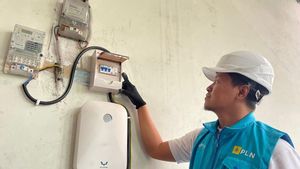JAKARTA - The Association of Indonesian Private Hospitals (ARSSI) has observed the dynamics of health services in 2022. ARSSI as one of the main stakeholders of health services in Indonesia highlighted two important points, namely the transformation of the National Health Insurance (JKN) system and program.
Of these two important points, ARSSI provides notes as well as input. ARSSI supports, is committed and ready to contribute to the success of the transformation of the health system consisting of six transformation pillars, namely Primary Service Transformation, Referral Service Transformation, Health Resilience System Transformation, Health Financing System Transformation, Health HR Transformation, and Health Technology Transformation.
Chairman of the Association of Indonesian Private Hospitals Ling Ichsan Hanafi said ARSSI also supports improving access to health services for the entire community. ARSSI plays an active and positive role in providing input on the preparation of health regulations and policies in the field of health.
"ARSSI encourages and helps the hospital members to always obey and follow regulations so that they can provide standard and quality services," he said, in Jakarta, Friday, December 30.
ARSSI helps its members' hospitals to be able to follow the stages of health transformation. ARSSI also hopes that the government will prepare stages of the transformation of the health system to consider the ability of hospitals and disparities in competence, facilities and infrastructure between the Milky Way and between regions in implementing the transformation stage.
He added that ARSSI and its member hospitals are ready to support and succeed in the JKN program as a strategic government program.
ARSSI encourages the hospital of its members in providing services to JKN participants to adhere to the principles: Patient Safety and Safety for All, Cost Effective, Cost Efficiency, and Hospitals not to get sick, cash flow is smooth and sufficient so that service needs are met and available when needed.
"In supporting the ease of access to health services to the community, ARSSI encourages all hospitals that meet the requirements and want and are willing to apply to become JKN providers not to be hampered on the grounds that the quota for health facilities is full," he explained.
Of the 3,123 hospitals in Indonesia, as many as 64 percent are Private Hospitals spread across all provinces in Indonesia.
ARSSI also encouraged its members' hospitals to carry out a mutual agreement and understanding contained in the Cooperation Agreement between RS and BPJS Kesehatan in serving JKN participants.
Since 2016 until today (more than 6 years) the JKN (INA CBG and Kapitasi) rates have not been adjusted, while hospital operating costs increase every year, such as: inflation occurs every year, UMP/UMR increases every year, fuel has gone up many times, prices for drugs and medical devices continue to rise and other operational support costs continue to increase.
Even if referring to the number 1, ARSSI proposes an average INA CBG rate increase of 30 percent.
The Ministry of Health is effective in calculating and setting an increase in JKN (INA CBGs and Capitation) rates, after receiving input from BPJS Kesehatan and the Association of Health Facilities.
Since April 2022, the process of calculating the increase in JKN (INA CBGs and Capitation) rates has been carried out, but to this day the increase in JKN (INA CBGs and Capitation) rates has not occurred.
In each stage of calculating the JKN tariff increase process, especially the INA CBGs tariff, ARSSI actively contributes data and input. After almost eight months of the JKN tariff calculation process, at the end of December 2022 the technical calculation process was completed and arrived at the final opportunity at the Ministry of Health level, the average increase in INA CBGs rates was 9.5 percent (after more than 6 years of not increasing).
"After the technical calculation process is completed and agreed upon, but at the discussion of the level of harmonization with the Ministry of Law and Human Rights on Wednesday, December 27, 2022, there are still those who question the amount of the percentage increase (9.5 percent) that has been agreed upon at the Ministry of Health level," he explained.
Referring to the number 7 and the dynamics of discussion at the harmonization level at the Ministry of Law and Human Rights, ARSSI really hopes that there will be no reasons or efforts to delay and slow down the revision of the JKN (INA CBGs and Capitation) rates.
In the future, ARSSI hopes that the Government will prepare stages of transformation of the health system to consider the ability of hospitals and disparities in competence, facilities and infrastructure between hospitals and between regions in implementing the transformation stage, so that it can be carried out.
The English, Chinese, Japanese, Arabic, and French versions are automatically generated by the AI. So there may still be inaccuracies in translating, please always see Indonesian as our main language. (system supported by DigitalSiber.id)













